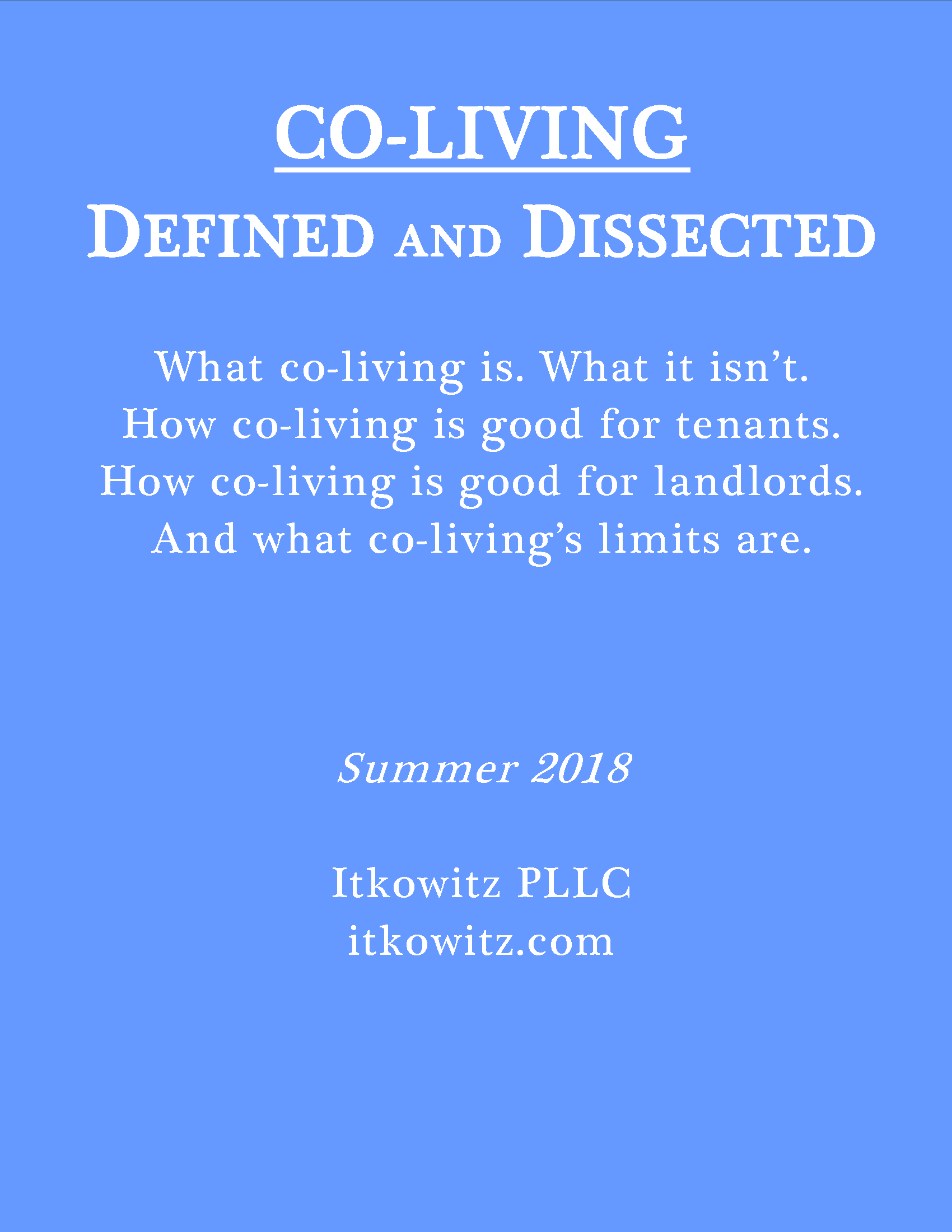Types of Co-Living Businesses and How The Smaller or Medium Owner or Manager Might Encounter Co-Living – and What To Beware Of!
July 26, 2018
On July 25, 2018, Michelle Itkowitz spoke at a LandlordsNY meet-up at SmartSpace in Brooklyn. Michelle’s topic this time was, “Co-Living Defined and Dissected – What it is. What it isn’t. How it’s good for tenants. How it’s good for landlords. And what its limits are.” Here is a link to the full materials. Here is an excerpt from the materials:
Types of Co-Living Businesses and How The Smaller or Medium Owner or Manager Might Encounter Co-Living – and What To Beware Of!
A. Co-Living Advertising Platforms
I am encountering many companies (I do not represent any) that have created platforms where landlords can advertise “rooms for rent”.
I think this is very problematic for owners or managers, since, as discussed in detail above, it is strictly illegal to rent rooms in regular buildings in NYC.
If you, as an owner or manager, advertise a room on such a platform, and subsequently get in trouble for it with the City, the State, or a court, then I doubt you could look to the co-living advertising platform for relief. See La Park La Brea A LLC v. Airbnb, Inc., 285 F.Supp.3d 1097 (USDC CD California, 2017) (Apartment owners and operators brought a putative class action against online housing marketplace asserting state law causes of action alleging that the rentals of their properties on the online marketplace’s website purportedly violated their own lease agreements with their tenants. Online marketplace moved to dismiss. The District Court held that an online marketplace was not an information content provider so that it was not precluded from asserting the Communications Decency Act’s (CDA) grant of immunity, and owners and operators’ claims treated marketplace as a publisher or speaker of the information that tenant users provided on its website, and thus the CDA’s grant of immunity preempted the claims.)
B. Co-Living Companies that Manage Your Asset
There are co-living companies that will manage an asset for an owner. The owner is still the landlord, and the co-living company is the property manager.
C. Co-Living Companies that Net Lease Your Asset
There are co-living companies that will net-lease a whole building. In this case, the owner is the landlord and the co-leasing company is the only tenant. Then the co-leasing company becomes to sub-landlord to the occupants of the apartments, the sub-tenants.
D. Risks When Working with Co-Living Management Companies or Net Leasing to a Co-Living Tenant
Co-living, if done improperly, can lead to serious consequences for an owner. I list them here:
• If the City inspects and finds, as per HMC § 27-2004(a)(15), that you are renting rooms, then there could be a finding of illegal SRO use, which could result in violations, fines, and vacate orders.
• If the building has less than six units, and co-living creates six or more units, and the building was building before 1974, then the building could be found to be Rent Stabilized. If a Building was built before 1974 and contains six or more units, then the apartments therein are Rent Stabilized. This is so, however, even if the building in question had less than six units in 1974, but after to 1974, six units were created in the building. This is so, even if the extra units were (a) illegally created, and (b) subsequently eliminated! See Wilson v. One Ten Duane Street Realty Co., 123 AD2d 198 [1stDept 1987]; Robrish v. Watson, 48 Misc3d 143(A)[App Term, 2nd Dept, 2nd, 11th & 13th Jud Dists 2015]; Joe Lebnan, LLC v Oliva, 39 Misc3d 31 [App Term, 2nd Dept,2nd,11th & 13th Jud Dists 2013] ; Rashid v. Cancel, 9 Misc 3d 130(A) [App. Term 2ndDept, 2nd & 11th JudDists 2005], 124 Meserole, LLC v. Recko, 55 Misc 3d 146(A) [App Term, 2nd Dept,2nd,11th & 13th Jud Dists 2017].
• The Tenants of such units could refuse to pay rent if the use of the subject building does not conform to the building’s certificate of occupancy by reason of the break-up of the apartments. Multiple Dwelling Law § 302(b).
E. The Owner-Operator Who Runs the Building with Co-Living
I have a client that is buying and renovating buildings for its branded co-living model. This client is already a big player on the national multi-family scene.
There is nothing to prevent a small operator from trying a co-living experiment! You can start small and work with just one apartment.
itkowitz.com






